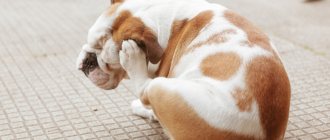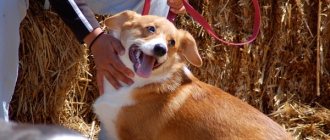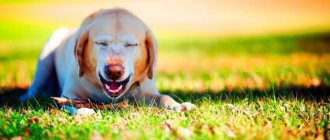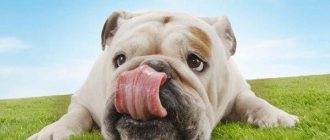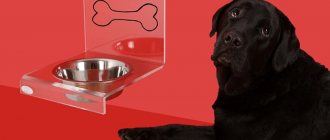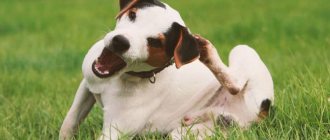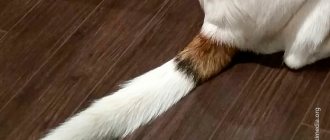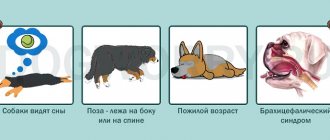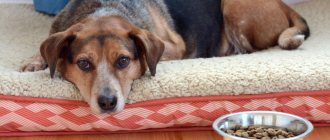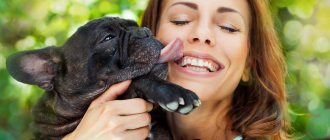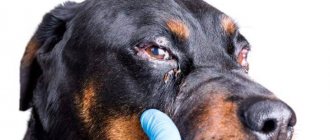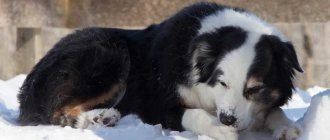The owner who has wondered why the dog eats its own feces and what to do about it is not alone. Most often, females of small breeds are engaged in eating excrement. This unpleasant tendency is called coprophagia and is not a disease. Despite this, it can and should be fought, since such a “hobby” can lead to very bad consequences.
Why is coprophagia dangerous in dogs?
Dogs eating feces is a dangerous habit that can lead to infection. The excrement of other animals can contain parasites, viruses and bacteria, so your pet is at risk of contracting the following diseases:
- Parvovirus enteritis
. This pathology is most severe in puppies. As a result of severe diarrhea and constant vomiting, severe dehydration develops, depleting the body.
- Toxoplasmosis
. This disease is equally dangerous for four-legged friends and their owners. Toxoplasma causes a severe blow to the immune system, so it is not always amenable to drug therapy in elderly pets.
- Helminthiasis
. A large ball of helminths is fraught with blockage and rupture of the intestines with subsequent release of the contents into the body. Severe intoxication is fatal.
- Leptospirosis
. The main symptom of Leptospira infection is jaundice. These parasites infect liver cells, causing irreversible pathological changes. Elderly dogs and puppies left without treatment die within the first day.
If you catch your four-legged friend eating other people's feces, try to find out the reason for his perverted preferences. This will help deal with the problem in the future.
Causes of coprophagia in dogs and puppies
For wild dogs, eating feces was an effective way of protecting themselves from predators. Females eating the feces of their puppies destroyed the odorous trail, confusing their pursuers. After domestication, the problem disappeared, and such behavior became unjustified and dangerous.
If a dog eats its own feces, then the reason for its behavior can be explained from a physiological or psychological point of view. Depending on the provoking factor, a veterinarian or animal psychologist may be needed for treatment.
Physiological
Most physiological causes are associated with disorders within the body. These include:
- Parasitosis. Infection with helminths often leads to a perversion of appetite. In addition to excrement, the patient may eat stones, soil and other inedible objects.
- Hunger. If there are long breaks between feedings, the animal may try to kill the worm in any available way.
- Syndrome of impaired absorption in the intestine. This pathology is accompanied by increased gas formation, foul-smelling stools, diarrhea and anemia.
- Hidden infections and gastrointestinal diseases. For this reason, your four-legged pet should first be checked by a veterinarian. Otherwise, weaning from an unpleasant habit may fail.
- Lack of digestive enzymes, vitamins and microelements. The excrement contains beneficial bacteria, so the pet simply replenishes its meager reserves.
If the animal is healthy and well-fed, then the answer will have to be sought in psychology. In the life of a four-legged friend, the attention of the owner plays a huge role, therefore, in its absence, the occurrence of coprophagia is the smallest possible problem.
Psychological
Psychological reasons are directly related to emotions and behavioral characteristics. These include:
- Jealousy
. If a dog is jealous of other pets, he may eat their feces to clear the area of foreign odors.
- Imitation
. After giving birth, the mother is responsible for the hygiene of her babies for a long time. If a puppy eats its own feces, it is simply imitating a more experienced animal.
- Dominant behavior
. Animals that constantly demonstrate their strength and superiority can force other four-legged animals to eat their excrement. Similar behavior from weaker dogs confirms the recognition of the leader.
- Curiosity
. Puppies learn about the world using all their senses. Sometimes they taste completely unexpected things.
- Prolonged stress
. Rare walks are fraught with incontinence. If the owner punishes for leaving piles, then over time the dog will begin to hide the “evidence”.
- Lack of attention
. A pet deprived of the owner’s attention will definitely try to attract him in any possible way. He may begin to damage furniture or bark loudly, disturbing neighbors.
- Competition for food
. A large number of domestic animals is fraught with periodic or constant taking of food. As a result, the dog swallows any stray piece without thinking about the nature of its origin.
Another possible reason is taste preferences. Some four-legged pets are crazy about the excrement of animals of other species, which leads to interspecific coprophagy.
How to wean it off?
First of all, you need to try to understand the reason why the dog does this. If the urge to eat excrement is a manifestation of the disease, then only contacting a veterinarian will help. If the problem is psychological, then it is necessary to adjust the pet’s life so that it is resolved.
In other cases, methods proven by many breeders will help:
- Try to protect yourself from this “delicacy” . When walking, control the animal with a leash; at home, immediately remove all feces as soon as they appear. If the dog lives in a private house with the possibility of walking in the yard, keep an eye on cleanliness.
- Provide your pet with the necessary number of toys so that he does not need to look for additional entertainment and pay attention to feces.
- Do not scold or hit puppies for accidental puddles and piles left behind. Small animals remember your reaction well. They will understand that leaving traces is bad, and will begin to actively hide them, including eating them.
- If you catch your dog getting close to feces, distract him with a loud noise or movement. Clap your hands or throw something loud, such as a bunch of keys, nearby. As soon as the dog is distracted, call him to you and make him perform several commands or play, then you need to praise the animal and give him something tasty.
- Don't give your dog free time during walks. Constantly keep him busy with something, exhaust him with active games and training. Then he will simply have no time to look for feces and be distracted by them.
- Use muzzles that prevent you from picking up anything from the ground.
- Give your pet as much attention as possible , praise him for the slightest success.
- As a last resort, you can risk smearing the poop with something sharply repulsive, for example, mustard or black pepper (in small quantities, of course). Communication with feces in this case should be under your control. As soon as your pet realizes that the “treat” is completely inedible, immediately wash out its mouth.
Almost every dog makes attempts to closely communicate with waste products, their own or those of others, especially in their youth. The owner’s task is to stop such behavior as unacceptable at the initial stage, and in the future carefully monitor that it does not recur. If you managed to wean your coprophagist from this addiction, you should not completely calm down; after a while, a relapse may well occur.
Why does a dog eat more than just its own poop?
If a dog eats cat feces, it is likely suffering from nutritional deficiencies. Cat feces are enriched with proteins and microelements, so four-legged pets equate it to a real delicacy.
The excrement of herbivores, containing large amounts of fiber, is no less nutritious. Therefore, in rural conditions, you can often see a dog looking for “tidbits” in horse or cow manure.
From a psychological point of view, coprophagia can be explained by a developed territorial instinct, dominant behavior or jealousy. By getting rid of feces, the dog eliminates traces of a competitor or tries to attract the attention of the owner.
Possible reasons
Here are some of the reasons you can look into.
Imitation
Very often, the dog eats poop, imitating the behavior of the mother dog, who destroys the poop's waste within a month after their birth. Puppies, looking at this behavior of their mother, also begin to eat their own piles, as well as piles of their brothers. Over time, if it is not prevented in time, eating stool becomes a habit.
Feeling of fear
Another reason why a dog eats poop may be fear. The dog begins to destroy feces, guided by natural instincts, in order to destroy, “cover” its tracks, so that a stronger predator does not find the pack by smell. This is the fear of attack. Four-legged animals are guided by the same fear when they begin to bark at passers-by, trying to protect themselves and their owner.
Feeling insecure
A dog eats poop on the street also because of insecurity. After all, if you look at it, feces left on the street are a kind of marks that animals leave, marking their territory.
The dog begins to leave his piles and eat others, trying to destroy the other dog’s marks and show that this is his territory, and he is in charge here. And this happens when the dog is not confident in itself and does not feel like a leader.
Lack of attention
You've probably noticed that when there is noise outside the door, your pet starts barking. And when the owner begins to scold him, the dog barks even louder. This happens because the dog thinks like this: now I will bark, the owner will pay attention to me. See how you can stop your dog from barking for no reason.
The same thing happens when a dog eats poop. The four-legged animal begins to eat its piles in the hope of attracting the attention of its owner. The tailed one does not think about further punishment. The most important thing is that the leader notices him, and punishment is already a kind of proof of belonging to the pack. The dog thinks like this: if I am raised, it means the pack needs me.
Wrong diet
The dog eats feces, succumbing to instinct. As everyone knows, wolves are considered the ancient ancestors of dogs. Have you ever noticed what wolves eat first when they kill game? No matter how strange it may seem to you, it’s not the best meat, but, of course, the stomach with all its contents. After all, the stomach contains the most beneficial nutrients for a predator.
A domestic dog is deprived of this opportunity. And if your pet’s diet is not balanced, then he begins to pick up everything he can find on the street. The following dietary abnormalities may contribute to this behavior:
- Feeding mainly cereals.
- Feeding only meat.
- Mixed diet (ready-made and natural products).
- Feeding bones, fatty and salty foods.
- Unbalanced diet, cheap feed.
- Overfeeding.
- Inappropriate treats or too many of them.
Analyze whether your pet's diet is balanced. Does he receive all the necessary minerals and vitamins in sufficient quantities? If you are a beginner, I advise you to carefully study which products can and should be given to your pet, and which are absolutely not allowed.
Your dog may be malnourished and may need to be fed more often or have larger portions. As a rule, after one year, a dog needs two meals a day. Read how to properly and how often you need to feed a puppy from one month to a year.
If your dog is eating poop, there is a good chance he is lacking protein or beneficial enzymes. Introduce a product such as tripe (cow's stomach) into your pet's diet. Read about beef tripe for dogs, the benefits of this product, and what dishes can be prepared from tripe.
Well, if you want to diversify your little tail’s diet, but don’t know what tasty things to prepare for him, then I can offer you delicious and healthy recipes for natural feeding of your pet.
Diseases of the gastrointestinal tract
Another reason for eating poop is diseases of the gastrointestinal tract. With puppies everything is clear, they explore the world and grab everything from the ground that is “bad.” Well, if an adult dog develops such a habit, then this already indicates disturbances in the body.
In this case, before punishing and training your pet, you must show the animal to a specialist, pass all the tests, and do an ultrasound. There can be many reasons: from banal worms to gastrointestinal diseases. To prevent this, regularly vaccinate and deworm.
Insufficient education
If the puppy is completely healthy, you have completely revised his diet and he receives the entire necessary set of vitamins and minerals, then you can stop him from picking up any garbage on the street only by completing a special training course aimed at correcting behavior and strengthening basic obedience skills.
How to stop a dog from eating feces: 6 methods
There is no single method that is suitable in all situations. You will have to deal with the situation through trial and error, based on the characteristics of your pet.
Behavior adjustment
It is better to discuss strained relationships between pets with an animal psychologist. You can help yourself only with enough food and daily monitoring during feeding. This will prevent theft from someone else's feeder.
Try to devote more time to your pet. Even a lap dog needs outdoor play. Do not limit communication to stroking and rare trips outside. Try signing up for agility - this sports discipline will bring you closer and make up for the lack of activity.
If you are very busy at work, you can keep your bored pet occupied with interactive toys. Some owners recommend leaving their pets with the TV on.
Start learning the prohibition commands. Using "ugh" and "don't" can easily prevent you from picking up questionable items while walking. At first, distract your pet with a toy and reward him with a treat. The easiest way is to entrust the learning process to a professional dog handler by enrolling in OKD or UGS courses.
Review of diet and vitamin supplements
If your dog eats feces, find out what it is missing. A lack of vitamins during dry feeding is only possible when using cheap economy-class feed. The raw materials of the lowest quality are used in their production. The composition of such feeds is not balanced. Plant components predominate over meat ones, and animal protein is the main source of nutrition for predators.
With natural feeding, vitamin supplementation is a prerequisite for creating a balanced diet. Get tested to understand what substances your pet needs. Based on the test results and medical history, the veterinarian will be able to select a specific drug.
Timely removal of feces
The best way to combat coprophagia is to eliminate provoking factors. Clean up after your pet while out on walks using bags. This helps clean the city and eliminates the possibility of eating fresh feces, which are of much more interest to animals than dried feces.
If a similar situation occurs at home, but the object of unhealthy love turns out to be cat feces, cut off access to it. Close the door to the toilet or other place where the tray is located tightly, not forgetting to make an opening for the cat.
If there are several coprophages, temporarily distribute them in different rooms. This will prevent repetition one after another while correcting behavior.
It will be more difficult with mother-fed puppies. They cannot be separated until the end of feeding, so only timely removal of feces will help here.
Using a muzzle while walking
Always keep your pet on a leash when other people and animals are around you. This is not only good form, but also an excellent way to stop unwanted actions.
Also, do not forget about the muzzle. Representatives of large breeds are difficult to keep even on a leash. Especially if your child goes for a walk with the dog. Buying a muzzle will simplify walking, eliminating the need for constant monitoring.
Screening for diseases
Sign up for an examination at a veterinary clinic to identify possible hidden pathologies or confirm your concerns if you have alarming symptoms. If an illness is detected, the perverted appetite will disappear on its own after recovery.
Use of special drugs
Eating of feces by dogs is prevented not only by taking vitamin and mineral complexes, but also by special preparations that change the taste of feces. They are divided into 2 types. The former are given to the coprophages themselves, and the latter to the animals whose excrement they consume. In addition to creating a bitter taste, the first type of drug helps to compensate for the lack of enzymes inside the body.
If the problem occurs on the street, then it is better to use spray medications. They are sprayed onto any excrement that interests the dog. Once convinced that it is inedible, he quickly loses interest.
What should an owner do to stop a dog from eating excrement?
So, it is clear that it is useless to admonish an animal and punish it like a preschooler. If something bothers a dog, it will solve the problem as nature dictates. Therefore, it is necessary first of all to exclude medical reasons. You should take tests of urine and feces, blood, and do an ultrasound examination. It is possible that the doctor will tell you to reconsider your pet’s diet. Only after making sure that the reason for the dog’s exotic culinary preferences does not lie in health can you contact a dog handler.
Ways to solve the problem
So, the algorithm of actions for weaning a dog from eating feces is as follows:
- visiting a veterinary center, examination;
- changing the diet, introducing vitamin and mineral supplements (vitamin B and sulfur are required);
- showing greater tolerance and patience towards your pet - after all, that’s why you got a dog, to make it happy;
- if there are several animals in the house, take this moment into account and pay more attention to the dog than before;
- distraction from feces by commands “Fu”, withdrawal from “targets”;
- immediately clean up waste after your pet on walks;
- After each trip to the toilet, reward your pet with a treat or favorite toy;
- consult a professional.
Important! If you still fail to stop the “fun” in time, never bring your face close to the dog’s face and fur - this can lead to serious infection.
Video - Why does a dog eat feces?
What mistakes should you not make?
The main mistake that coprophagous owners make is the use of screams and physical force as punishment. Such actions do not help, but only worsen the existing picture. A frightened animal perceives the process of defecation as something forbidden, so it begins to destroy “evidence” furtively.
If there are psychological problems associated with lack of attention, any reaction will be perceived by the pet as approval. In such a situation, it is better to use ignoring. Avoid hugging and licking for the time being. If your pet cannot bear it because of your prolonged absence, silently take him for a walk and be sure to praise him after relieving himself.
Sometimes dealing with coprophagia is difficult and long, but it is quite possible. During training, maintain composure and try to avoid common mistakes. In most cases, the culprit of the problem turns out to be a disease or the owner himself, so feel free to go to the veterinarian and think about the warmth of your relationship with your four-legged friend.
The article is for informational purposes only. Contact your veterinarian!
How to wean your dog off a bad habit
If you catch your pet eating other people's excrement, first of all you need to contact a veterinarian and find out the reason for this behavior of the dog. To do this, you need to undergo an examination to identify diseases or internal parasites. The veterinarian can also help create a new diet that will contain all the necessary minerals and vitamins. If the reason for eating feces is a disease, then you first need to cure it, and only then wean the animal from the bad habit.
Sometimes, in order to wean a dog from a bad habit, you will have to use different options; sometimes you need to try everything to achieve the desired result. The most effective of them are the following:
- Eliminating the possibility of eating. If several animals live in the same area, you need to remove the pet's feces after each bowel movement, not giving the dog a chance to eat someone else's feces.
- When the dog owner notices that the animal is preparing to eat feces, you need to divert his attention to other objects, for example, give him something tasty. The same method should be used if the pet is trying to attract the owner’s attention by eating feces.
- A puppy needs to be trained from an early age. He must clearly understand and follow prohibiting commands. During the training process, he needs to be walked on a short leash. As soon as the pet reaches for the pile of feces, it must be pulled away, while loudly pronouncing the prohibiting command.
- Treating feces with pepper, horseradish, mustard and other hot preparations will make the taste of feces less attractive to the dog and, over time, will discourage the pet from eating them.
